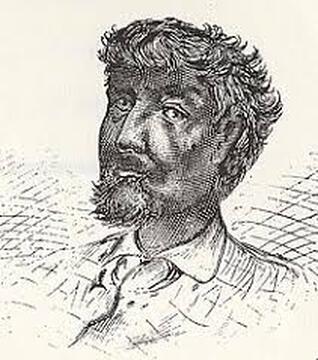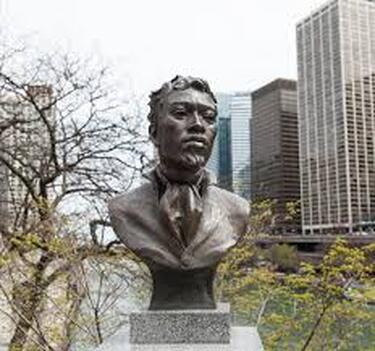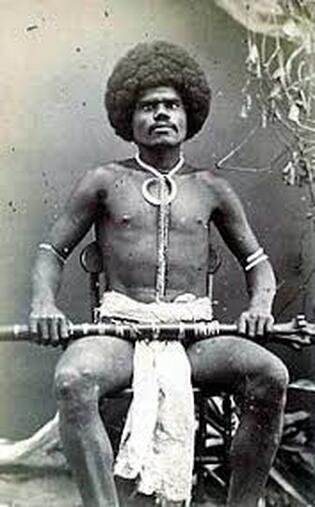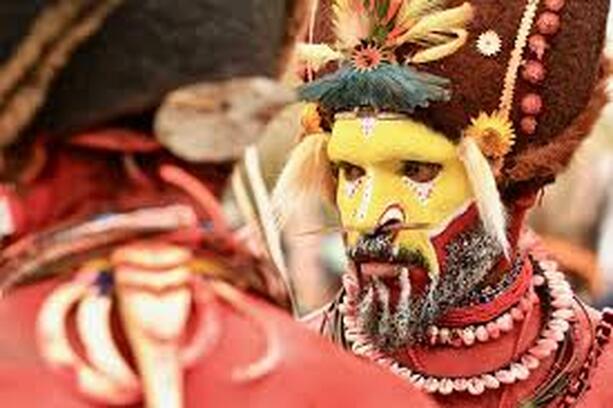|
In a village named St. Marc on the island of Saint Dominique, which is now Haiti, Jean-Baptiste Pointe DuSable was born around the year 1745. DuSable’s mother was an African woman who was formally enslaved and his father was a French sailor; because Dusable’s mother was free at the time of his birth he was born free of enslavement. DuSable would eventually travel throughout the world with his father being educated and even spending a few years learning in France. Gaining his traveling education DuSable learned to speak several languages and dialects including French, English, Spanish, Pidgin languages, and several Indigenous American dialects. Sources suggest that DuSable began traveling with his father because his mother was killed when their boat was raided by the Spanish. In 1765, traveling on his father’s ship from Saint Dominique to New Orleans the ship crashed injuring Du able and causing him to lose his identification papers. DuSable’s injuries were severe and took some time to heal, during his recovery he was almost enslaved because he did not have his identification papers, what saved him was several French Jesuit Priest protected him until his wounds healed. When DuSable’s injuries healed he and a young man named Jean-Baptiste became traders which led them to travel up the Mississippi River settling in what is now Peoria, Illinois, he also settled briefly in Indiana and Michigan. While living in Michigan DuSable married a woman named Kitihawa from the Pottawatomie tribe, the couple produced two children Susanne and Jean. In 1779, DuSable was accused of being a spy, arrested by the British, and imprisoned in Fort Michilimackinac for some time until he was released into the custody of the British Lieutenant Patrick St. Clair. DuSable was forced to manage St. Clair’s woodlands which resided along the St. Clair River in Michigan. Between the late 1770s and the early 1780s, DuSable and his family settled in North East Illinois along Lake Michigan in an area then called Eschikagu, which means “the place of bad smells”. DuSable’s home was built upon eight-hundred acres of land along the North bank of the Chicago River. Using his creativity and resources DuSable established a trading post in Eschikagu which eventually became the most successful trading post in the mid-west. The trading post made DuSable a wealthy man who was able to support his family and buy the finest of items for his home. The name Eschikagu eventually became primarily pronounced as Chicago because of Europeans who could not pronounce Eschikagu correctly. The ongoing American Revolution forced Du Sable and his family off of their lands and stripped them of their rights by the British, he migrated to Michigan where he opened and operated a new trading post. After the conclusion of the American Revolution DuSable was able to reclaim the rights to his land in Chicago and continued to grow his businesses. When DuSable married Kitihawa he was also accepted by the Pottawatomie tribe as one of their own, his great relationship with his wife’s tribe allowed him to hire a few Pottawatomie tribesmen to work for him helping to expand his business. Even though his trading post was thriving, DuSable decided to sell it in the year 1800 to a fellow resident of Chicago named John Kinzie for $1,200. After selling his trading post in Chicago DuSable moved near the Peoria, Illinois area, he owned a farm for ten years, selling it when his wife died. Following the death of his wife DuSable and his daughter moved to St. Charles, Missouri, which was French territory at the time, he was hired by the French governor to operate a ferry on the Missouri River. DuSable faced many financial challenges after moving to Missouri, he could not recreate the wealth he built working his trading post in Chicago. He would lose a lot of money and die in 1818 being finically assisted by his daughter. John Kinzie would eventually take credit for establishing Chicago, a story that would be thought of a fact until the truth about DuSable surfaced. The city of Chicago unofficially recognized DuSable as its founder in 1912, it wasn’t until 2006 that the city of Chicago officially recognized that a black man named Jean-Baptiste Pointe DuSable established their city. A lot of the information about DuSable is either hidden or lost, but we do have enough information to verify his pioneering feats, the second-largest city in America, and the largest trading post in the mid-west was created by a black man, let that sink in. I had the privilege of traveling to Chicago and seeing the monument of DuSable for myself, one of the highlights of my trip. To Jean-Baptiste Pointe DuSable, we proudly stand on your shoulders. J.A. Ward Click the link to learn more about the On the Shoulders of Giants book series!! References:
http://blackhistorynow.com/jean-baptiste-pointe-du-sable/ https://www.blackpast.org/african-american-history/dusable-jean-baptiste-point-1745-1818/ https://www.wbez.org/stories/the-father-of-chicago-jean-baptiste-pointe-dusable/24858f5f-0620-4003-9b84-ac3fe294e1c3 https://en.wikipedia.org/wiki/Jean_Baptiste_Point_du_Sable
0 Comments
The South Pacific Islands are areas that are often forgotten when discussing the African diaspora, when we do discuss the South Pacific we mostly talk about the continent of Australia, the Hawaiian Islands, Fiji, and New Zealand. These areas are mostly known as vacation locations for those seeking a tropical adventure; unbeknownst to many people, these areas have become home to members of the African diaspora for tens of thousands of years. The South Pacific has three major groups of islands Polynesia, Micronesia, and our focus Melanesia. The name Melanesia is Greek in origin and it means “black islands” because the indigenous inhabitants of the islands are black people; the French explorer Jules Dumont d'Urville gave the name Melanesia to the islands. The name Melanesian is not the most accurate term used to describe the people and the cultures of the islands, but I will use the term only because of familiarity. Melanesia is made up of 2,000 islands which house around twelve million people, islands that were first inhabited around 70,000 years ago. The Solomon Island, Fiji, Vanuatu, Papua New Guinea, New Caledonia, several archipelagos, countries, and smaller islands are what makeup what is considered Melanesia. As people began migrating out of Africa populating the world, South Asia and the South Pacific became home to many people bringing their different cultures and ways of living. Two distinct cultural groups are credited with being the first inhabitants of the Melanesian Islands, the Papuans, and the Austronesians, the Papuans inhabited the islands first followed by the Austronesians 3,000 years ago. According to a genetic study by Temple University in 2008, the inhabitants of Melanesia have a very distinct genetic make-up that differs from the inhabitants of Micronesia and Polynesia. Not all, but a number of the people of Melanesia have a distinct look of black skin, blonde hair, and blue eyes. This phenotype is due to a genetic mutation that as far as we know can only be found in Melanesian people. Due to European and Indonesian colonization some of the indigenous names and cultural practices of Melanesia were either replaced completely or the indigenous people infused their culture with European and Indonesian cultures. European colonization began in the 1500s with the arrival of the Spanish and the Portuguese in the Maulku and Solomon Islands as well as Papua New Guinea. During the 1800s European colonization reached its apex as the practice of “blackbirding” became more and more popular. Blackbirding is the practice of enslaving the Melanesians and forcing them to work for their enslavers in Australia. Britain eventually became the main colonizers of Melanesia during the 1800s before they came under the colonization of Indonesia in the 1900s. The people of Melanesia speak Austronesian and Papuan languages, the Austronesian languages originated from Southeast Asia, as opposed to the Papuan languages that originated in Papua New Guinea and New Guinea. Of the two main language groups mentioned previously they consist of close to 1,319 sub-languages that include a Melanesian creole and pidgin languages, French and English are also languages spoken by the people. Melanesia is rich in natural resources yet the economy and the people are poor. Like the African continent, Melanesia is constantly mined and robbed of its natural resources by colonizers as the people are subjugated and used to work the mines. Christianity, Hinduism, and Islam have largely replaced the indigenous spiritual practices of Melanesia. Family structures are both matrilineal and paternal; both monogamy and polygyny are practiced by the Melanesians, who place a large emphasis on family structures. Extended families are welcomed and treated as the nuclear family with reverence for their elders and ancestors. I first became aware of the Melanesian Islands as a middle school student but didn’t learn much about the people or their cultures, like me millions of other people either have little knowledge of or no knowledge at all of the people of Melanesia. African people have given the world so much but are greatly oppressed and enslaved around the world. One of the missions of On the Shoulders of Giants is to not only bring attention to African people that exist around the world but expose the plight we experience. To the millions of Melanesian ancestors and Melanesian people who exist today, we proudly stand on your shoulders. |
Details
Categories
All
Click Here to join our mailing list
|
Contact Us: |
Connect With Us |
Site powered by PIT Web Design





 RSS Feed
RSS Feed



